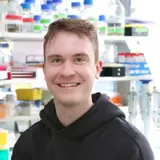Pediatric Leukemia
- KiTZ
- NCT
- Cell and Tumor Biology
- Clinical Cooperation Unit

Prof. Dr. Andreas Kulozik
Acute lymphoblastic leukemia (ALL) represents the most common malignancy of childhood. While the majority of leukemias in children and adolescents originate from precursor B-cells, precursor T-ALLs represent a particular challenge.

Our Research
Although 80-90% of affected patients can be cured from their primary disease on modern treatment protocols, relapses have a particularly poor prognosis thus indicating a fundamental difference in the biology between these different stages of disease evolution in this type of leukemia. Therefore, it is our goal to understand the biology of pediatric T-ALL and translate this knowledge into better treatment. By performing targeted genetic and genomic analyses our previous research identified genetic changes impacting on treatment response and prognosis (Breit et al. 2006, Kox et al. 2010, Bandapalli et al. 2014, Richter-Pechanska et al. 2017). In our current research we focus on high risk genetic markers that hallmark relapsed T-ALLs and that may already be present in small subclones at the time of primary disease. As mutations in epigenetic regulators are common in T-ALL, we further focus on epigenetic differences of T-ALLs compared to normal thymic precursors and have found that the chromatin accessibility of T-ALLs, including those with mature immunophenotypes, resemble the most immature normal thymic precursor cells and identified surprising transcriptional profiles in epigenetically defined subtypes of T-ALL (Richter-Pechanska et al. 2018, Erarslan-Uysal et al. 2020).
In our future work we will remain focused on the question of how the biology of T-ALL relapses explains the exquisite treatment resistance in this challenging phase of disease evolution in this type of leukemia. An important cornerstone of our future work will be the observation that T-ALL relapses can be biologically distinguished by their leukemic cell of origin. While 'type 1' relapse derives from the major clone prevalent at the time of the primary leukemia, 'type 2' relapse originates from a pre-leukemic ancestor that only exists in a small subclone of the primary leukemia (Kunz et al. 2015). By comparing primary and the two types of T-ALL relapses in the same patients by multi-omic longitudinal analyses we are now aiming at identifying the type-specific functional pathways responsible for the clinical aggressiveness of the relapsed disease. Further we will aim at functionally validating pathways that emerged from our previous genomic and epigenomic analyses.
Team
-

Prof. Dr. Andreas Kulozik
-
Christopher Carnie
-

Nicole Dickemann
-

Dorian Dragicevic
-
Jose Antonio Duarte Conde
-
Yuan Feng
-
Annika Fröhlich
-
Laura Hendricks
-
Stephanie Hoffmann
-

Dr. Ashok Kumar Jayavelu
-
Chantal Jekien
-
Sanja Jelaca
-
Dr. Irmela Jeremias
-

Marianna Kombou
-
Kristina Kuhbandner
-
Wurigamule Leibe
-
Kanchana Maharjan
-
Archisman Maitra
-

Lianghao Mao
-
Sarah Masser
-
Dhruv Mehra
-

Dr. Lavanya Mokada Gopal
-
Liliana Mura
-
Siddhi Anil Pawar
-
Zahra Rafiee Pour
-
Aishwarya Rajamohan
-
Corinne Rossi
-
Guochen Wan
-

Yongjie Wang
-
Yujian Xu
-
Sercan Öz
Selected Publications
Erarslan-Uysal B, Kunz JB, Rausch T, Richter-Pechanska P, van Belzen IA, Frismantas V, Bornhauser B, Ordoñez-Rueada D, Paulsen M, Benes V, Stanulla M, Schrappe M, Cario G, Escherich G, Bakharevich K, Kirschner-Schwabe R, Eckert C, Loukanov T, Gorenflo M, Waszak SM, Bourquin JP, Muckenthaler MU, Korbel JO, Kulozik AE
Richter-Pechanska P, Kunz JB, Bornhauser B, von Knebel Doeberitz C, Rausch T, Erarslan-Uysal B, Assenov Y, Frismantas V, Marovca B, Waszak SM, Zimmermann M, Seemann J, Happich M, Stanulla M, Schrappe M, Cario G, Escherich G, Bakharevich K, Kirschner-Schwabe R, Eckert C, Muckenthaler MU, Korbel JO, Bourquin JP, Kulozik AE
Richter-Pechanska P, Kunz JB, Hof J, Zimmermann M, Rausch T, Bandapalli OR, Orlova E, Scapinello G, Sagi JC, Stanulla M, Schrappe M, Cario G, Kirschner-Schwabe R, Eckert C, Benes V, Korbel JO, Muckenthaler MU, Kulozik AE
Kunz JB, Rausch T, Bandapalli OR, Eilers J, Pechanska P, Schuessele S, Assenov Y, Stütz AM, Kirschner-Schwabe R, Hof J, Eckert C, von Stackelberg A, Schrappe M, Stanulla M, Koehler R, Avigad S, Elitzur S, Handgretinger R, Benes V, Weischenfeldt J, Korbel JO, Muckenthaler MU, Kulozik AE
Get in touch with us

